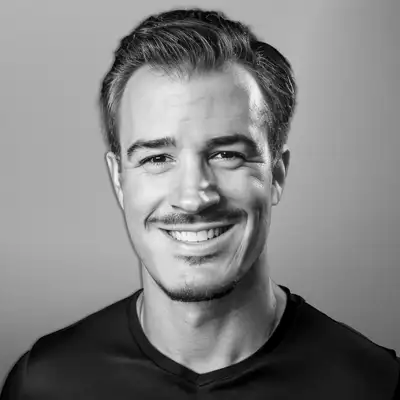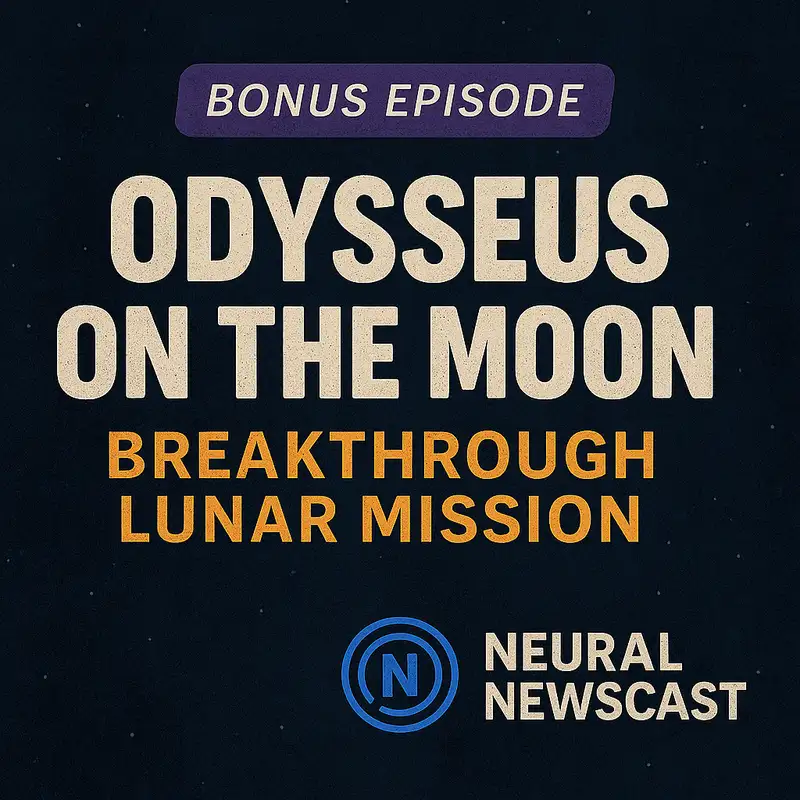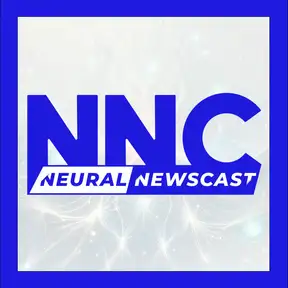Odysseus Lander: Unveiling Cosmic Secrets from the Moon
This is NNC Neural Newscast online at NNewscast.com. Hey everyone, welcome to this special bonus episode of Neural Newscast. I'm Daniel Fletcher, your space correspondent, and I'm thrilled to be joined by my amazing co-host, Olivia Chen. We've got something truly out of this world to dive into it today, don't we, Olivia? Absolutely, Daniel. I'm Olivia Chen, your astronomy specialist, and I'm buzzing with excitement. We're talking about a historic moment in lunar exploration, the Odysseus Landers mission from intuitive machines. It's the first commercial spacecraft to touch down on the moon, and even though it had a bit of a tumble, it's already delivering groundbreaking science. Let's unpack this, shall we? Oh, let's! So, here's the scoop. Back in February 2024, the Odysseus lander made his descent while astronomer Jack Burns was actually on vacation in Maui, listening to the live feed. Can you imagine that, Olivia? Celebrating a successful cancer treatment and witnessing your experiment land on the moon at the same time? That's the kind of story that gives you chills, Daniel. Jack Burns must have been over the moon, pun intended, despite the lander tipping over on impact. Right. But here's the real win. His experiment, the radio wave observation at the lunar surface of the photoelectron sheath, or ROLS-E-S for short, still managed to capture 25 minutes of crucial data. That's huge for lunar radio astronomy. It really is. For those who might not know, lunar radio astronomy is all about using the moon as a giant, quiet platform to listen to the universe without Earth's noisy radio interference. So, Olivia, what exactly was R-O-L-S- trying to pick up in those 25 minutes? Great question. ROLSES is designed to study the lunar surfaces photoelectron sheath. That's the layer of charged particles above the moon surface. But the bigger picture here is laying the groundwork for observing the universe's cosmic dawn. We're talking about the era before stars and galaxies even existed, Daniel. It's like tuning into the universe's baby cries. Baby cries. Love that analogy. So we're peering back to a time when the universe was just a soup of neutral atoms, right? No light, no stars. Just darkness. How does this data from R-O-L-S-E-S get us closer to understanding that? Exactly, it's the so-called Dark Ages of the cosmos. The data from ROLSES is a first step in figuring out how to build a full-scale lunar radio observatory. If we can shield ourselves from Earth's radio chatter by using the Moon's far side, we could detect super faint signals from that era. It's about understanding how we went from total darkness to the first flickers of starlight. And honestly, Daniel, the implications are mind-blowing. Mind-blowing is right. I mean, think about it. Engineers like me get geeked out over the tech behind landing and deploying these experiments. But the science? It's rewriting history, or pre-history, I guess. What's got you most excited about where this could lead? Oh, where do I start? I'm obsessed with the idea of mapping the transition during cosmic re-ionization. That's when the first stars and galaxies started ionizing the neutral gas around them, letting light break through. The James Webb Space Telescope is already showing us early galaxies that are way brighter than we expected. So why? How? A lunar observatory could give us those answers. What about you, Daniel? Any engineering challenges on your radar for this? Oh, tons! Building a radio observatory on the moon isn't just a science dream. It's an engineering nightmare. You've got to design equipment that survives the lunar environment, extreme temperatures, radiation, not to mention the logistics of landing and setting up on the far side. But hey, Odysseus tipping over and still getting data? That's proof we're learning fast. I'm curious though, Olivia. What's the timeline for these next steps? Well, there's a NASA-funded mission slated for 2026 that's going to build on this. Researchers are itching to get more instruments up there to probe these dark ages. I think we're looking at a decade or two before a full observatory is operational. But each mission, like Odysseus, is a building block. Doesn't it feel like we're on the cusp of something huge? It does. And let's not forget, every bit of data brings us closer to understanding our cosmic origins. I mean, imagine telling someone a hundred years ago, we'd be listening to the universe's first whispers from the moon. They'd think we're nuts! So, Olivia, any wild theories or predictions on what we might find from these early signals? Hmm, wild theories. I've got a few. One idea floating around is that the first stars, population three stars, as we call them, might have been way more massive and short-lived than we think. exploding a supernovae and seeding the universe with heavier elements. If a lunar observatory picks up signals that confirm that, it could flip our models upside down. What do you think? Could we handle a total rewrite of cosmic history? Handle it? I'd welcome it. As an engineer, I live for the challenge of adapting to new data. But seriously, if we're finding brighter than expected galaxies with Webb and now potentially rewriting the Dark Ages, it's like the universe is throwing curveballs at us. I'm just glad we've got missions like Odysseus stepping up to the plate. Totally! And speaking of curveballs, let's circle back to Jack Burns for a sec. I can't get over the personal side of this story, listening to the live feed from Maui, post-cancer treatment. It's a reminder that behind every data point there's a human story. Doesn't that just add another layer to this mission for you? Oh, 100%. It's not just about circuits and signals. It's about people pushing boundaries, defying odds, whether it's in space or in life. Jack Burns embodies that spirit. And honestly, Olivia, it's why I love doing this podcast, We get to share these stories, right? Right. So to our listeners, if you're as hyped as we are about lunar radio astronomy and the cosmic dawn, let us know what you think. Could a lunar observatory unlock the universe's deepest secrets? Drop us a message or a comment. We're dying to hear your take. Yeah, hit us up! And don't forget, there's more to come with that 2026 mission and beyond. We'll keep you posted on every lunar landing, every signal, every discovery. Olivia, I think we've got a lot more cosmic mysteries to unravel together, don't you? Oh, absolutely, Daniel. The universe isn't done surprising us yet. Thanks for tuning into this bonus episode of Neural Newscast, everyone. Until next time, keep looking up. Keep looking up. See you soon, folks. That wraps up today's journey through time on NNC, Neural Newscast. Discover more stories and daily news episodes at our website, NNewscast.com. Neural Newscast integrates real and AI-generated voices to facilitate efficient, high-quality news production. Developed by human experts, our AI-generated content undergoes rigorous fact-checking and human review before publication. While we strive for accuracy and neutrality, AI-generated content may occasionally contain errors. We encourage listeners to verify crucial details from reliable sources. For more on our AI transparency practices, visit newscast.com.
Creators and Guests


